
Aaron Park
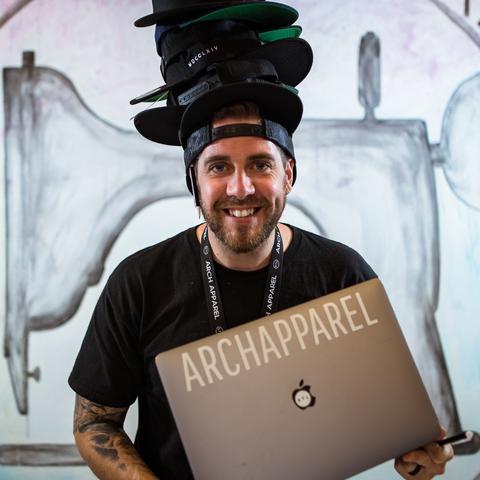
Initially drawn to the United States as a young undergraduate student, Aaron Park’s relationship to the city of St. Louis has evolved as he has taken on new roles: as a husband, a parent, a homeowner, and as an entrepreneur of his growing business, Arch Apparel. Park’s wish is that his business and experience as an immigrant will beneficially impact the future of our evolving city for both locals and internationals.
Having befriended some US students studying abroad in his hometown of Melbourne, Australia, a younger Park resolved to finish his Bachelor’s of Business, including a focus on marketing and human resources, in the United States. With an ability to choose from numerous colleges across the country, Park said he decided on Drury University in Springfield, Missouri because he wanted to experience something different than what he was already familiar with. In 2006, Park completed his degree with a final semester of study at Drury and says that he originally never had a predetermined plan to stay in the United States after finishing his bachelor’s: “I didn’t consciously think I would be gone for any set period of time, I was just living. I didn’t view it like leaving Australia. As a young educated person I wanted to travel and live my life. I just kept living it.” Shortly after his graduation, Park returned to live and work in Springfield on an E3 visa - a particular visa for Australian nationals which allows them to pursue professional work related to their specialization studied. Park explains that he was lucky to receive the visa initially since “the tricky part about the E3 visa is having an employer sponsor you, to say that your college degree is being used on a professional level.” Later on, he was able to reapply, and renew the visa three separate times.
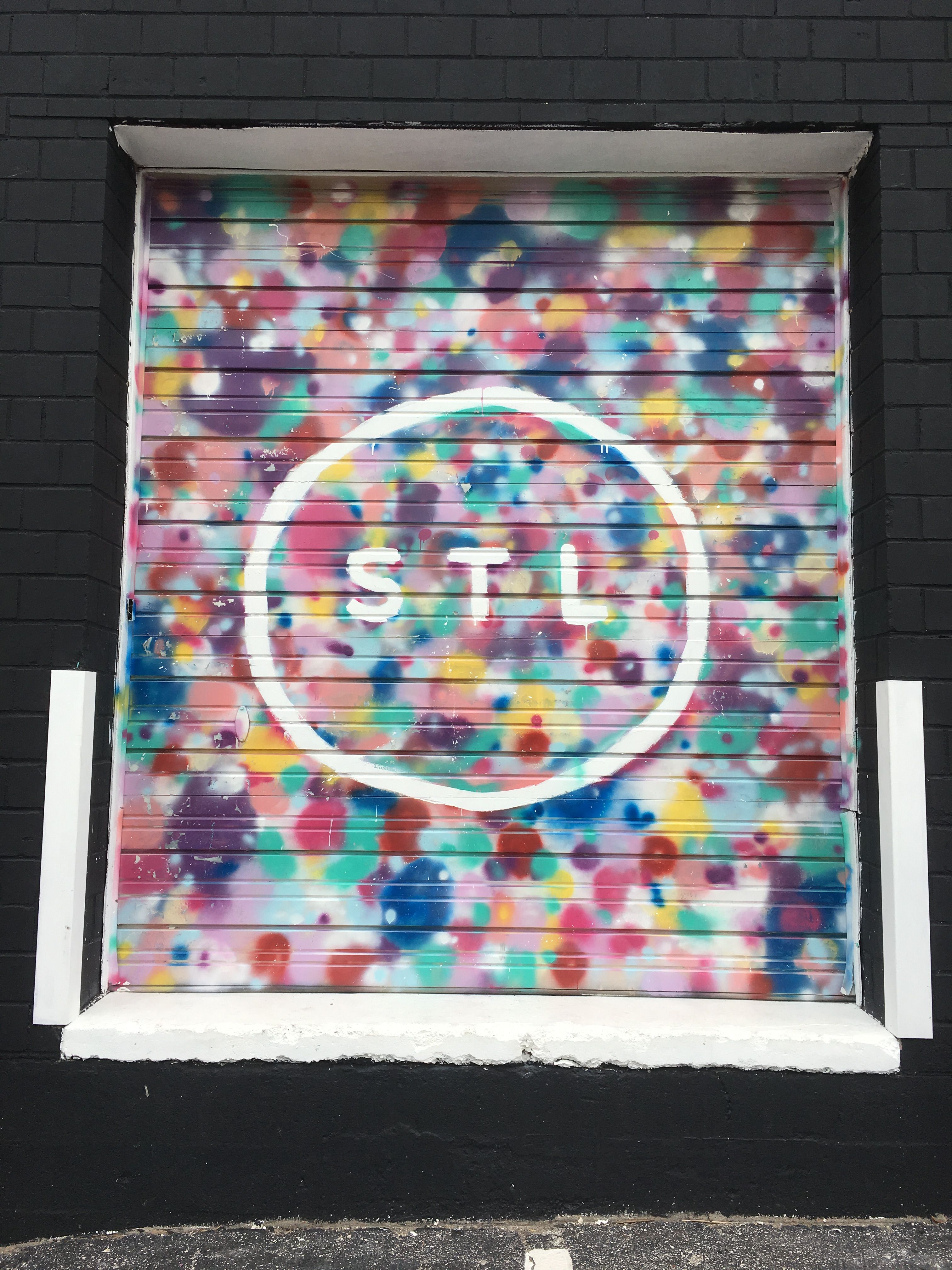
During his time in Springfield, both as an undergraduate and a young professional, Park distinctly remembers driving to St. Louis often to escape small town life: “[My wife and I] both wanted careers, our friends and her family were in St. Louis, we wanted new experiences - restaurants, shops, bars, major sports, life - and that was harder to get in a small town.” Years after his first move from Australia, Park and his wife both received job offers and relocated to St. Louis. Park’s new job in the city was to visit various high schools in the St. Louis Public School (SLPS) District and present to senior classes on professionalism and the next steps of applying to college. Park explains how his identity as an Australian living in St. Louis aided him in connecting with kids from this district, many who might be coming from hard situations at home. By simply being not what the kids thought he was at first glance - an American young adult white male handing them packets for the best paths to success - Park earned credibility with his audiences and was much better equipped to deliver his message about preparing for college and a career. After 3 years visiting high schools, Park took a new job in interior design and sales and soon after began his own Arch Apparel business on the side.
One of the first things Park fell in love with living in the United States was the gravity of major league sports culture, expressing how the US appears as a Mecca of sports for the outside world. Not only the ability to watch sports any night of the week, even multiple games simultaneously, but the comradery behind city-based teams was something Park had never experienced before. Park related how the community of the city, as it related to teams like the Blues and the Cardinals, felt completely different than back in Melbourne which is also known as the sporting capital of the world, with more than 30 local teams in different sports. “The team becomes part of the fabric of the city. In Melbourne there are so many sporting teams which call it home, but in St. Louis one single team is part of the culture of the city.” This same pride for a single team and a city sparked his own entrepreneurial journey from a desire to feel part of a community while still holding true to what he loved.
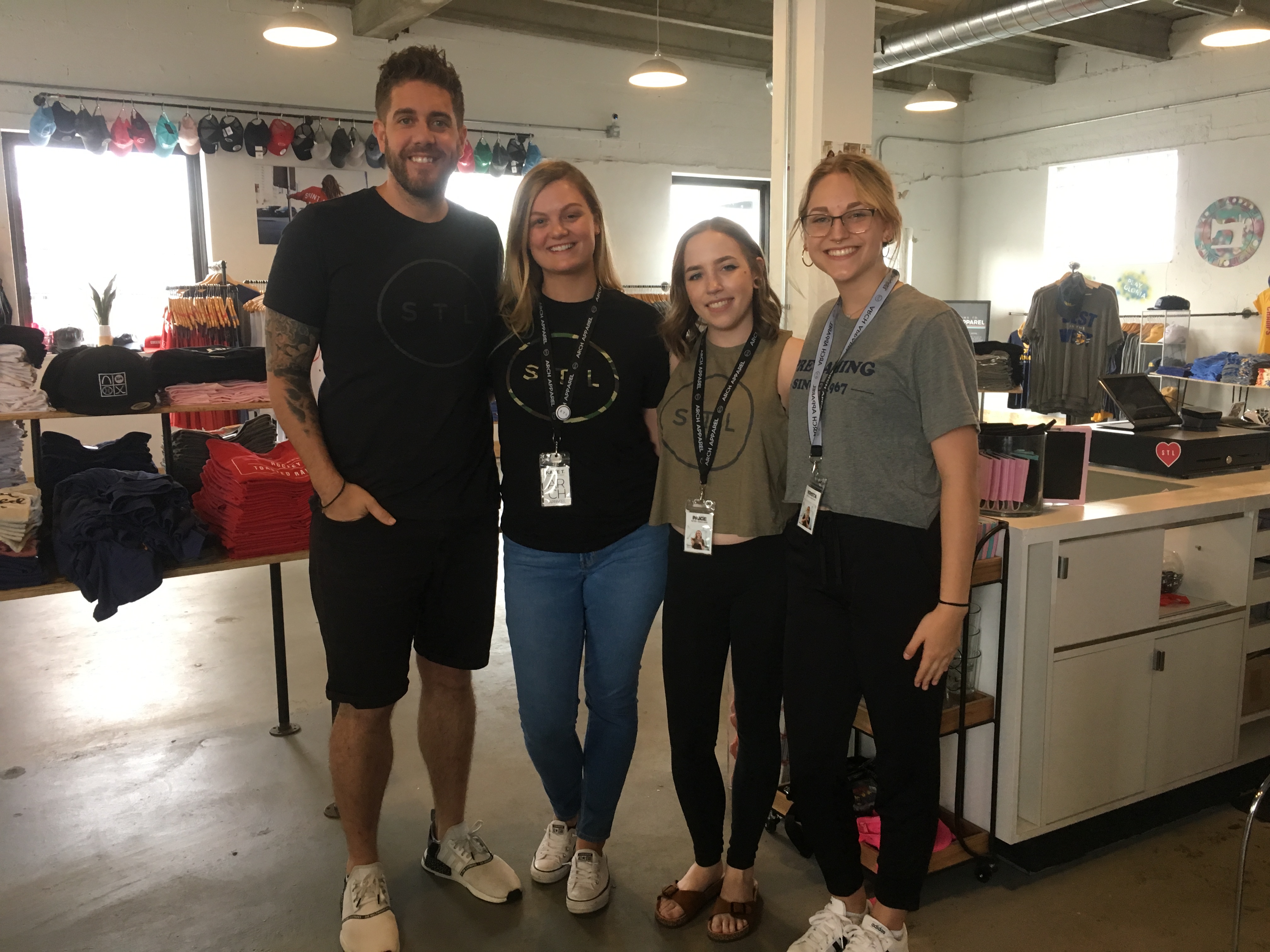 Living in St. Louis and converting into a Cardinals’ fan, Park started to feel like something was lacking in the city’s identity, or his own identity as a St. Louis resident: “it began because for me, I didn’t like the feeling of going to a Cardinals game and wearing a bright red t-shirt with a cartoon bird on it. It just didn’t fit who I was or what I liked wearing.” Park started a quest, searching around St. Louis for a city-themed t-shirt to fit his clean and simpler style. Unable to find quite what he was wanting, Park didn’t just accept the red cartoon bird shirt. Instead he made his own shirt - and he got lots of compliments. “I always believed there were other people looking for the same thing I was. There’s other companies that sell St. Louis stuff and t-shirts, of course. But they were doing it differently.” Inspired by a passion to build city pride through wearables, Park started the Arch Apparel project while still working his full time day job, taking on every responsibility within his own company and going to all extremes: “I took the shirt off my back before and put it in a bag to send to California because someone was going to be wearing it on TV.” Even not being a St. Louis native himself, Park believes that he brings a unique perspective to what a t-shirt can really offer and adds that everyone on the team at Arch Apparel plays a key part in the success of the company.
Living in St. Louis and converting into a Cardinals’ fan, Park started to feel like something was lacking in the city’s identity, or his own identity as a St. Louis resident: “it began because for me, I didn’t like the feeling of going to a Cardinals game and wearing a bright red t-shirt with a cartoon bird on it. It just didn’t fit who I was or what I liked wearing.” Park started a quest, searching around St. Louis for a city-themed t-shirt to fit his clean and simpler style. Unable to find quite what he was wanting, Park didn’t just accept the red cartoon bird shirt. Instead he made his own shirt - and he got lots of compliments. “I always believed there were other people looking for the same thing I was. There’s other companies that sell St. Louis stuff and t-shirts, of course. But they were doing it differently.” Inspired by a passion to build city pride through wearables, Park started the Arch Apparel project while still working his full time day job, taking on every responsibility within his own company and going to all extremes: “I took the shirt off my back before and put it in a bag to send to California because someone was going to be wearing it on TV.” Even not being a St. Louis native himself, Park believes that he brings a unique perspective to what a t-shirt can really offer and adds that everyone on the team at Arch Apparel plays a key part in the success of the company.
Park wanted quality and simplicity, something casual and classic. He wanted to be able to rep his new hometown and feel fashionable. Park testifies that starting the business allowed him to see St. Louis in a different light, personally knowing more deeply the people of St. Louis. “Part of the fabric of the community is the people and what I love about entrepreneurship and how that relates to my life is the people who are involved in my life are the people who work here and live here.” Park further explains that he did not create the business with a plan to make money necessarily. Instead, he wanted to create a place where people who want to represent St. Louis would have an outlet.
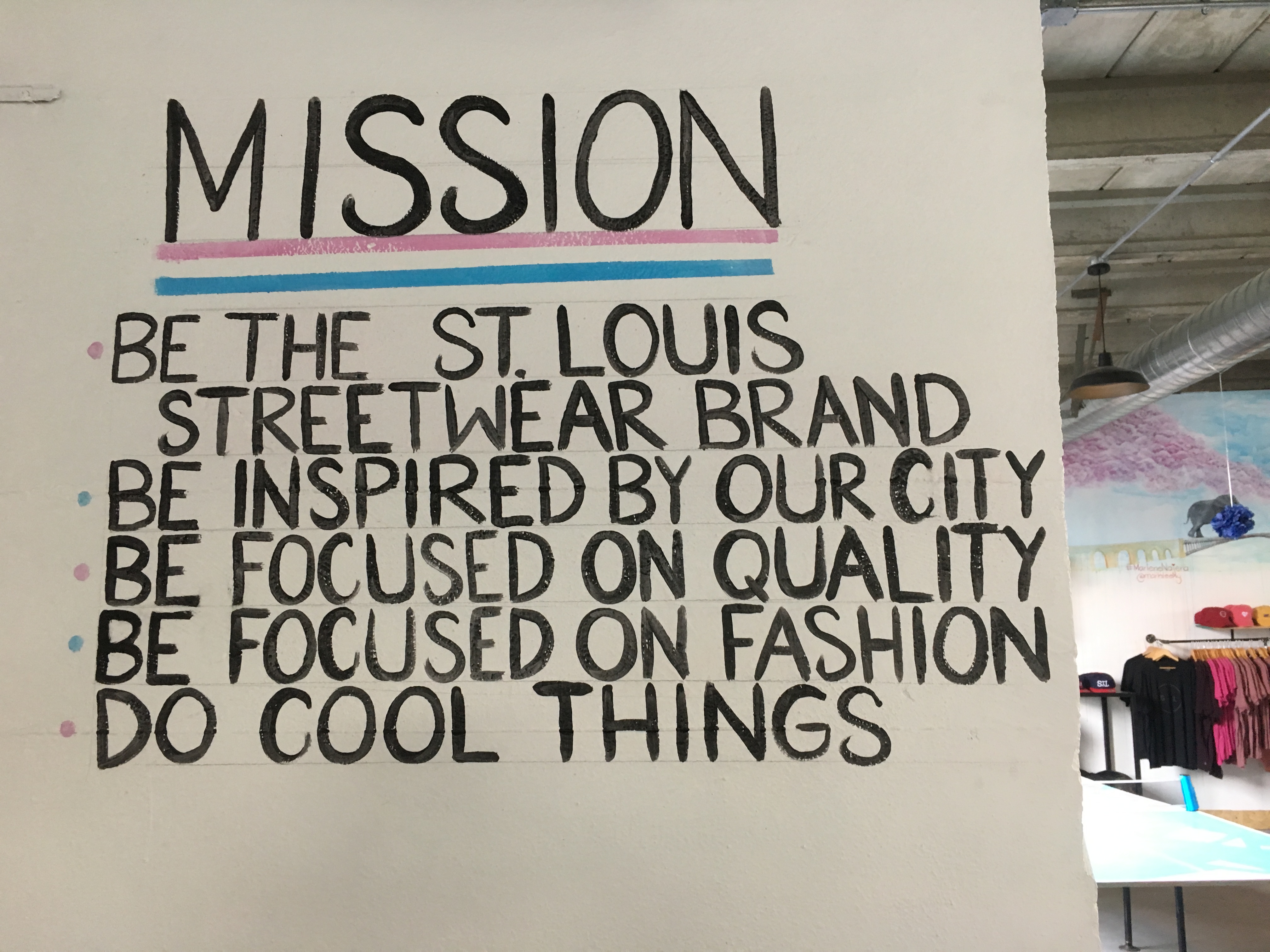 He also claims that Arch Apparel’s presence in St. Louis is just getting started. Park describes how hectic and crazy starting the business was, “I was working 80-100 hour weeks, and that’s crazy, but the passion for me was so high for what I was doing that there was no clock ticking. I think it’s important to have a dream or a goal. It doesn’t matter if you get there but you have to head towards something.” Still dreaming and still growing, Park already has his eyes on further expansion and envisions a second Arch Apparel location emerging in one of the new developments happening in St. Louis, such as City Foundry. “I always had the vision that we would end up in this position, and I still feel like we’re about halfway to where I want to get us to.”
He also claims that Arch Apparel’s presence in St. Louis is just getting started. Park describes how hectic and crazy starting the business was, “I was working 80-100 hour weeks, and that’s crazy, but the passion for me was so high for what I was doing that there was no clock ticking. I think it’s important to have a dream or a goal. It doesn’t matter if you get there but you have to head towards something.” Still dreaming and still growing, Park already has his eyes on further expansion and envisions a second Arch Apparel location emerging in one of the new developments happening in St. Louis, such as City Foundry. “I always had the vision that we would end up in this position, and I still feel like we’re about halfway to where I want to get us to.”
Through his business, Park has been able to step onto the other side of immigration visas and bring his own experience full circle by acting as a business sponsor for Arch Apparel’s Content Designer and Community Outreach Coordinator, Firth Bidois. An original New Zealander who came to the United States to play college hockey, Park is able to vouch for Bidois’s work authorization as she follows her own degree in business in the United States. 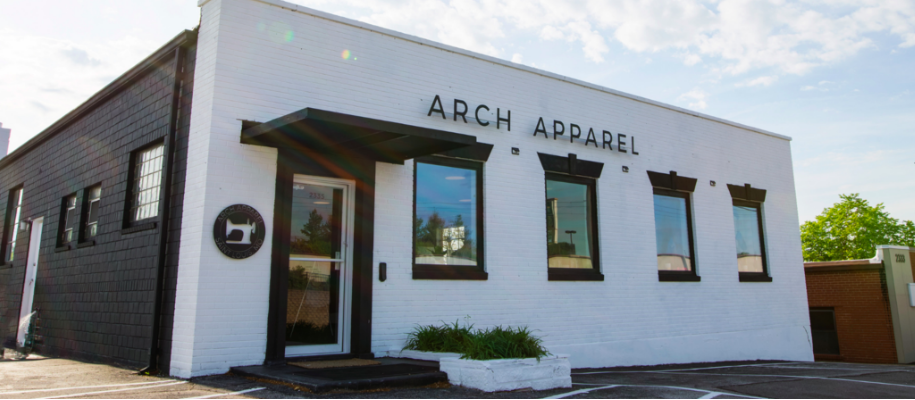
Not just focusing on his business anymore, Park is starting to find a better balance with Arch Apparel and his personal life. In particular, Park enjoys spending more time with his son and hopes to spend more time traveling with him in the future to give him that same worldly experience he was able to encounter in his study abroad.
Park stands with St. Louis, claiming the city as his home and believing that it is on a positive direction to overcome the challenges associated with a melting pot community. Park highlights the current food scene flourishing in St. Louis as a love of his and also hopes to see a successful MLS team and stadium in the future, not just for his love of sports, but additionally as an opportunity to shape the growth of St. Louis. “I think an MLS team would increase the diversity of our culture. We would see things that St. Louis hasn’t ever seen before. I would appreciate the on-the-field play, but I also appreciate somewhat more the way it would impact and elevate our city.” Park himself hopes to be a catalyst for change in whatever way presents itself to him, wanting to donate his perspective lens as an immigrant to St. Louis’s city narrative and foster the creation of a community with a progressively open mind.
Interviewed and written by Julia Cogan
